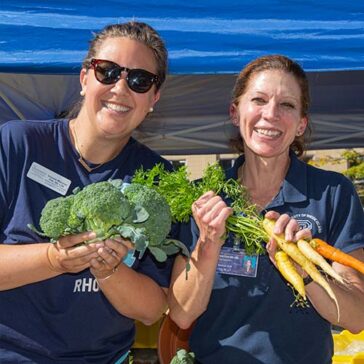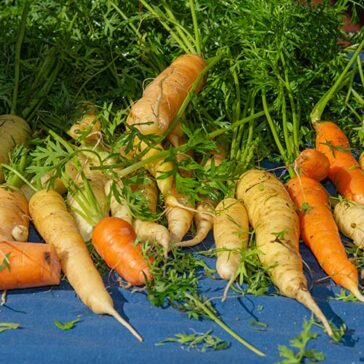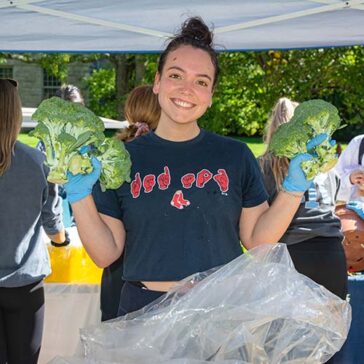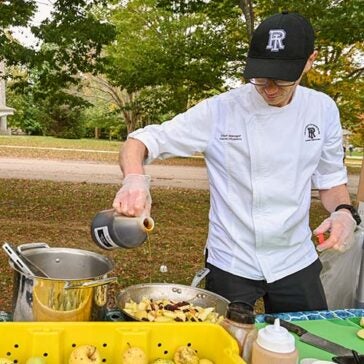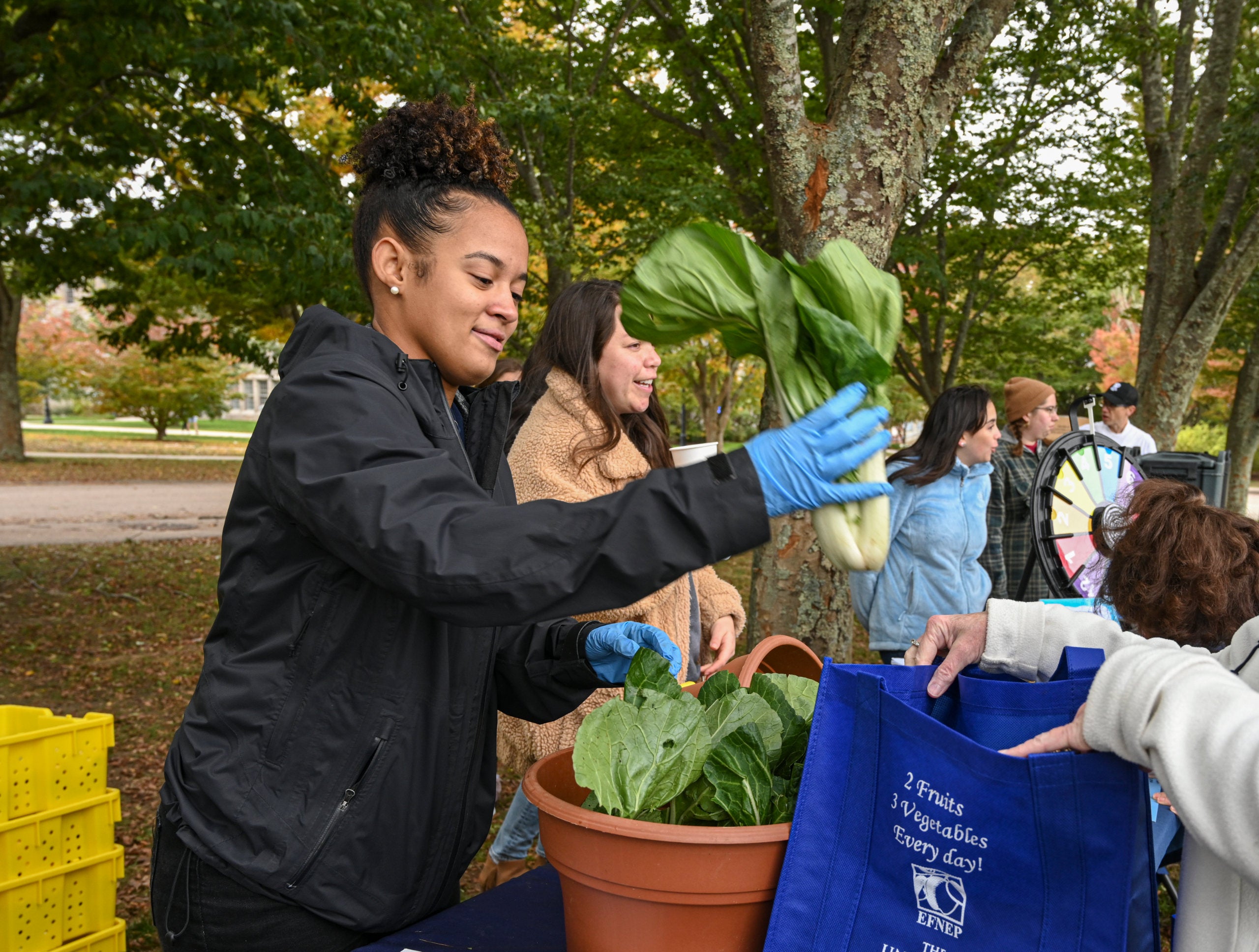
Picture this: It’s a perfect fall day on the Quad. Excited students wait in line, talking and laughing as they head toward bins brimming with Swiss chard, radishes, apples, broccoli, beets, kale, and maybe some purple cauliflower. A chef prepares something with apples that smells—and tastes—delicious. Looks like fun. Maybe it’s a party. A really healthy party where you leave with a bag full of fruits and vegetables, no charge.
From September 9 to October 28, such was the scene at the new URI Free Farmers’ Market, held on the Quad Thursdays from 11 a.m. to 12 p.m. and 2 to 3 p.m.
To those who made it happen, URI’s Free Farmers’ Market (FFM) was a model of collaboration, a wellness program, an example of good karma, and a labor of love. It was also a success. The data shows that over the market’s seven-week run, approximately 1,450 (first-time and repeat) students filled their bags with free fruits and vegetables of all kinds, harvested less than 24 hours earlier at URI farms.
‘We wanted to do our part’
Free Farmers’ Market (FFM) co-coordinator Amanda Missimer, clinical assistant professor of Nutrition and Food Sciences, believes access to fresh fruit and vegetables is critical to good health, and that for some college students, access can be difficult. “We wanted to do our part to connect the food systems at URI to the students on campus. Being able to provide easy-to-access fruits, vegetables, and eggs along with recipes and some nutrition information is us doing our part,” she said.
Doing their part meant Missimer and fellow co-coordinator Kelli Kidd, URI sports nutrition specialist, needed a system with people to harvest and move produce from the URI farms to the Quad each week where volunteers would set up the market, serve the students, conduct research, and break down the market. They did it, thanks to the work of dozens of URI community members and volunteers in what can certainly be called a model of collaboration.
“This project connected multiple colleges, departments, and sought to reach and include many areas of URI food systems,” said Missimer, who is also co-founder of the Food Recovery for Rhode Island program through URI Cooperative Extension.
Campus-wide participation
Each week, approximately 50 volunteers—including faculty, staff, and students—participated in making the market happen,” said Kidd. “Helping with the harvesting highlighted the hard work that goes into getting the vegetables and fruit to our tables.” Students from some of URI’s athletic teams and clubs picked apples. Volunteers came from everywhere. There were interested faculty, master gardeners, staff from Campus Recreation, the Counseling Center, and students majoring in the health sciences and nutrition, some of whom were working on a FFM-related research project for credit.
Paige Nickla ’22, a nursing major with a nutrition and food systems minor, and grad student Nick Hamdi worked together with Community Nutrition Education Director Sarah Amin’s lab on a FFM research project involving health equity, food security, and improving social conditions.
“As a nursing student, I have seen many patients who are not sure how what they eat impacts their overall health. My goal as a nurse is to help patients and guide them through nutrition education as it applies to their overall well-being. I hope to become more involved in my community as a nurse and help supply food to areas that need it most, because food insecurity is a very prevalent social issue.
“I had a great experience working with the FFM this semester,” said Nickla. “Not only did I get to work and collaborate with amazing students and professors, but I was able to be a part of URI’s first ever FFM and impact hundreds of students. I learned that food insecurity exists, even at URI. Being able to provide fresh, free produce was truly a rewarding experience.”
‘Good karma’
Aaron Fitzsenry of URI Dining Services appeared each week to cook on site using produce available that day. Crowd favorites included his famous apple blueberry compote and apple and beet salad with Swiss chard and cranberries, available for tasting, along with cooking tips. His favorite tip: Good ingredients make great food and usually require little manipulation to get there.
“The personal reward for me was simple good karma that comes with helping others,” he said. “What struck me as being so important was the market created a reinforcing sustainable loop, finding a positive way to reintroduce the fruits of URI back to the student body in a way that encourages learning and connections. Everyone who participated learned plenty of things we didn’t expect to learn as a part of this experience.”
‘NoURIishing your Mind and Body’
Looking ahead, Kidd hopes to be able to expand the market to include even more resources. “My long term vision of the FFM is to not only make the Quad a weekly stop to get nourishing food, but also a place to learn and get more information about all of the campus resources we have for complete wellness,” she said.
“Kelli and I are truly grateful for all of the support of faculty, staff, and students who made this all possible and especially to all the students who waited in line and shared with us how much the Free Farmers’ Market meant to them,” said Missimer. “It was overwhelming how excited the students were each week. I consistently heard, ‘Really, this is all for us?’ and, ‘It’s free?'”
“This is about nutritional education and food security in our community,” she added. “By combining the work of so many campus programs, we were able to create ‘NoURIshing Your Mind and Body’ on the Quad each Thursday. The connection of food grown less than a mile away, harvested less than 24 hours prior, and the ability to provide that to the URI community of students at no cost was a real labor of love.”
—Nicki Toler

